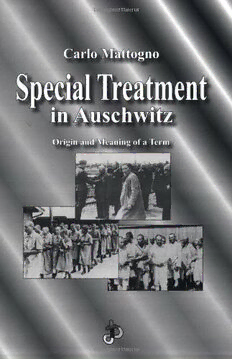
Special Treatment in Auschwitz: Origin and Meaning of a Term PDF
152 Pages·2004·6.786 MB·English
Most books are stored in the elastic cloud where traffic is expensive. For this reason, we have a limit on daily download.
Preview Special Treatment in Auschwitz: Origin and Meaning of a Term
Description:
According to official historiography, terms like "special treatment," or "special action," when occurring in German documents in the context of the "Holocaust", were camouflage words which really meant the killing of inmates. When appearing in German wartime documents in the context of the "Holocaust," terms like "special treatment," "special action," and others have usually been interpreted as code words that signify the killing of inmates. While certainly the term "special treatment" in many such documents meant execution, the term need not always have had that meaning in German records. In Special Treatment in Auschwitz, Carlo Mattogno has provided the most thorough study of this textual problem to date. Publishing and interpreting numerous such documents about Auschwitz — many of them hitherto unknown — Mattogno is able to show that, while "special" had many different meanings in these documents, not a single one meant "execution." This important study demonstrates that the habitual practice of deciphering an alleged "code language" by assigning homicidal meaning to completely harmless documents — a key component of the exterminationist historical method — is no longer tenable. By bringing numerous documents into their proper historical context, Carlo Mattogno shows that this interpretation is profoundly wrong...
See more
The list of books you might like
Most books are stored in the elastic cloud where traffic is expensive. For this reason, we have a limit on daily download.
